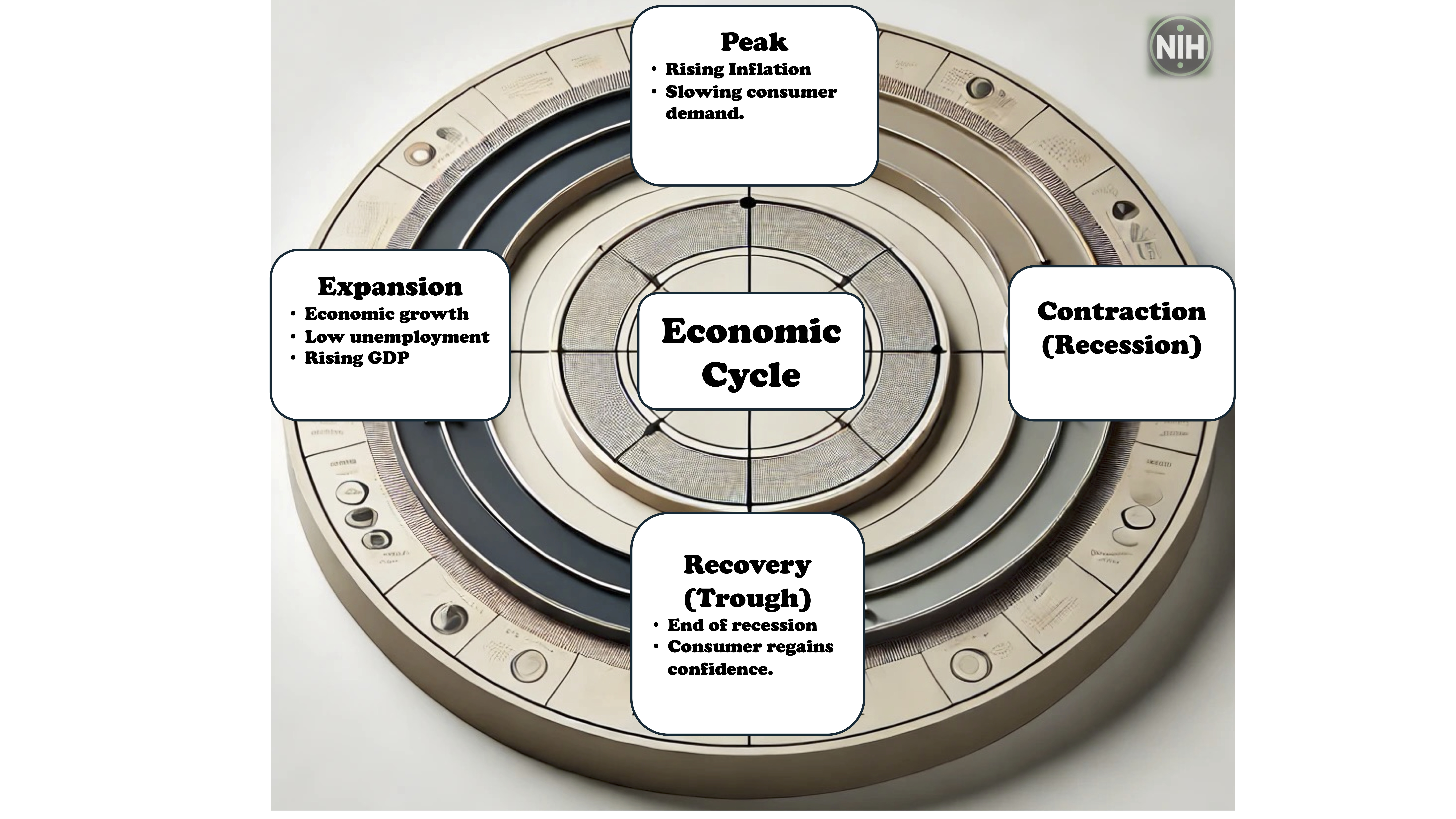Economic cycles, also known as business cycles, are the natural fluctuations in economic activity over time. These cycles consist of four distinct phases: Expansion, Peak, Contraction (Recession), and Trough (Recovery). For Nigerian investors, understanding these cycles is crucial for identifying investment opportunities and adjusting strategies to align with economic changes.
This article explains the four phases of economic cycles, how Nigerian sectors perform during each phase, and how to adapt investment strategies to maximize returns.
Phases of the Economic Cycle
1. Expansion
• Overview:
The expansion phase is characterized by economic growth, rising GDP, low unemployment, and increasing consumer spending. Businesses expand operations, and stock markets often show bullish trends.
• Impact on Stocks:
• High Performers: Consumer goods, financial services, and real estate.
• Examples: Nestlé Nigeria, GTCO, and Dangote Cement thrive as demand for goods and services increases.
2. Peak
• Overview:
The peak represents the economy’s highest point of growth before a downturn begins. Inflation may rise, and consumer demand slows due to higher costs.
• Impact on Stocks:
• Stocks may plateau or become overvalued. Investors may start reallocating portfolios to defensive sectors.
• Examples: Infrastructure projects slow down, and sectors like real estate may see reduced activity.
3. Contraction (Recession)
• Overview:
During a contraction or recession, economic growth declines. This phase is marked by higher unemployment, reduced consumer spending, and lower corporate earnings.
• Impact on Stocks:
• High Performers: Defensive sectors like agriculture, utilities, and telecommunications tend to be stable.
• Examples: Companies like Presco PLC, MTN Nigeria, and Transcorp Power remain resilient due to consistent demand for essential goods and services.
4. Trough (Recovery)
• Overview:
The trough marks the end of the recession and the start of recovery. Economic activity stabilizes, and businesses and consumers regain confidence. Stock markets begin to recover as corporate earnings improve.
• Impact on Stocks:
• High Performers: Cyclical sectors like manufacturing, financial services, and technology rebound.
• Examples: Flour Mills of Nigeria, Access Holdings, and Airtel Africa often perform well as economic activity picks up.
How Nigerian Sectors Perform During Economic Cycles
| Phase | Top-Performing Sectors | Examples of Companies |
|---|---|---|
| Expansion | Consumer goods, banking, real estate | Nestlé Nigeria, GTCO, Dangote Cement |
| Peak | Defensive sectors gain favor as inflation rises | Presco PLC, MTN Nigeria, Transcorp |
| Contraction | Agriculture, utilities, telecommunications | Presco PLC, MTN Nigeria, Transcorp |
| Recovery | Manufacturing, financial services, technology | Flour Mills of Nigeria, Access Holdings |
Adapting Investment Strategies to Each Economic Phase
1. Expansion: Growth Investing
- Focus: Invest in growth-oriented sectors like consumer goods, financial services, and real estate.
- Stocks to Watch: GTCO, Nestlé Nigeria, Dangote Cement.
- Strategy: Allocate more capital to cyclical stocks and growth sectors to capture economic momentum.
2. Peak: Portfolio Rebalancing
- Focus: Gradually shift investments to defensive stocks to hedge against an impending downturn.
- Stocks to Watch: MTN Nigeria, Transcorp Power, Presco PLC.
- Strategy: Reduce exposure to overvalued growth stocks and consider income-generating assets.
3. Contraction: Defensive Investing
- Focus: Prioritize stable sectors like agriculture, utilities, and telecommunications.
- Stocks to Watch: Presco PLC, MTN Nigeria, Transcorp Power.
- Strategy: Protect your portfolio by focusing on dividend-paying stocks and companies with strong fundamentals.
4. Recovery: Cyclical and Value Investing
- Focus: Invest in undervalued cyclical stocks that benefit from economic recovery.
- Stocks to Watch: Flour Mills of Nigeria, Access Holdings, Airtel Africa.
- Strategy: Combine cyclical stocks with value stocks to take advantage of rebounding corporate earnings.
Long-Term Strategy: Diversification
- Spread investments across multiple sectors to reduce risks associated with economic fluctuations. A mix of defensive and growth-oriented stocks ensures portfolio stability through all phases.
Conclusion
Economic cycles significantly influence Nigerian stocks and the performance of various sectors. For Nigerian investors, understanding these cycles and aligning investment strategies with each phase is crucial for maximizing returns. By focusing on high-growth sectors during expansions, defensive stocks during recessions, and cyclical opportunities during recovery, investors can effectively navigate economic changes.
Stay informed about economic indicators like GDP growth, inflation, and forex trends to anticipate cycle transitions. With a strategic approach, Nigerian investors can capitalize on opportunities across all phases of the economic cycle and achieve long-term success in the dynamic Nigerian market.
